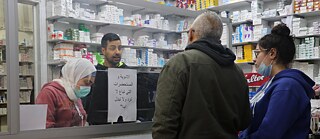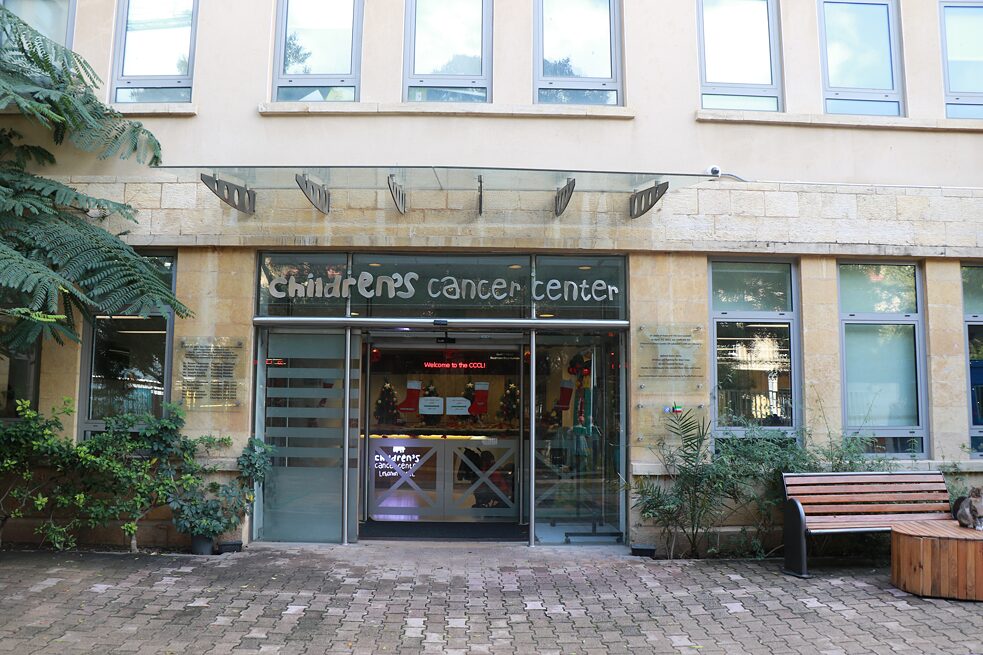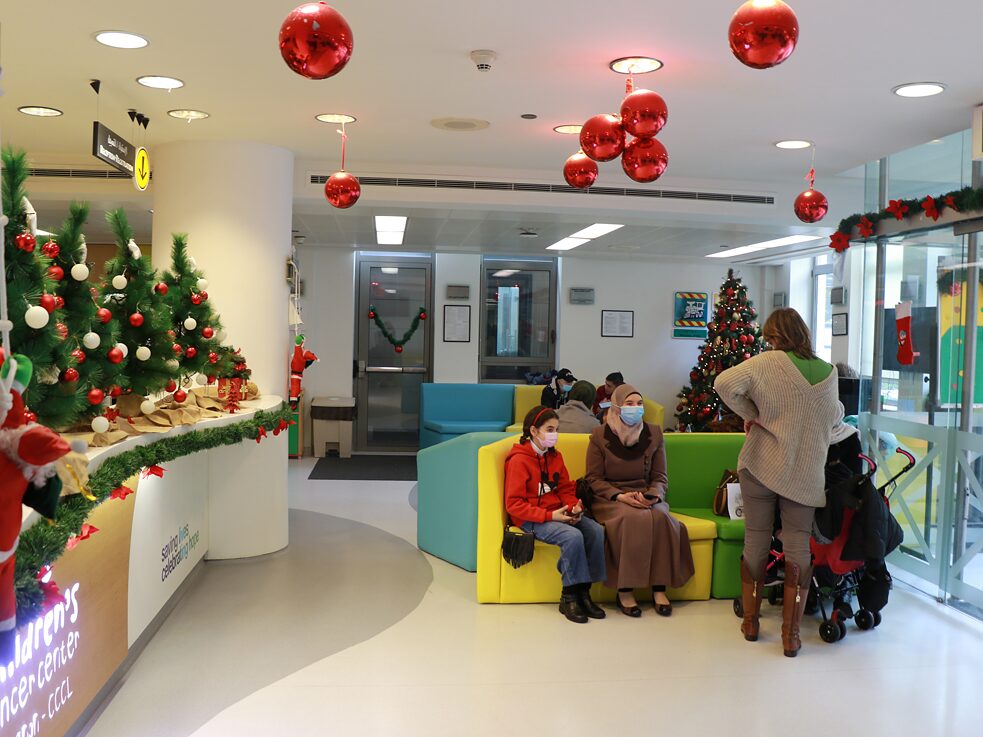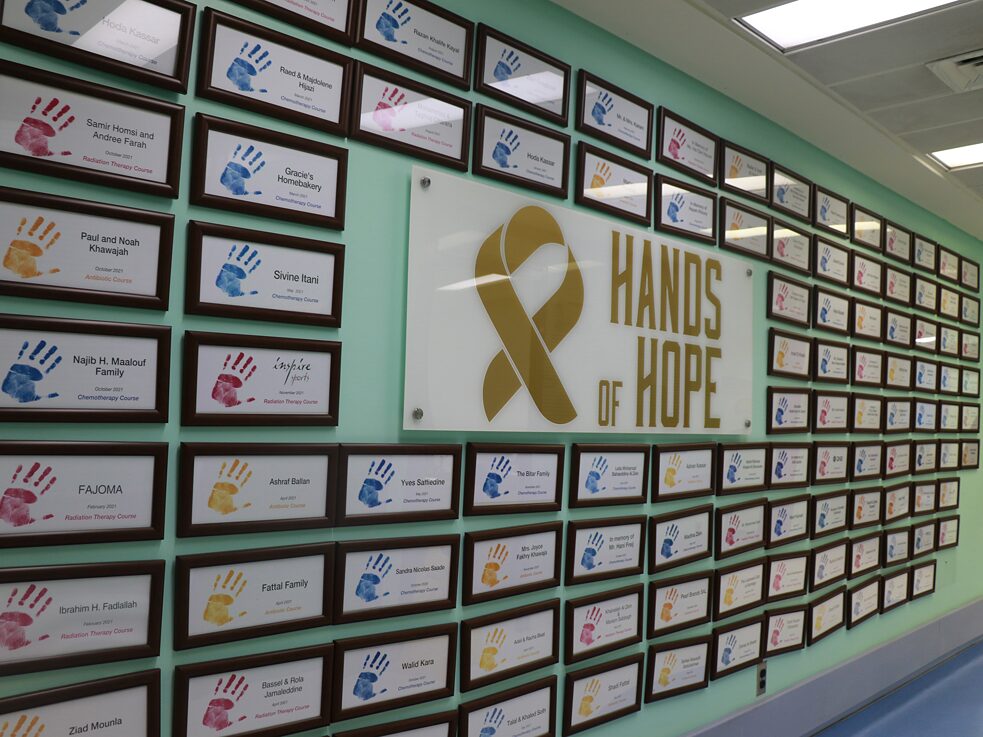Following the economic collapse, Lebanese people suddenly found themselves without medical »care«, as defined and guaranteed by the modern state, along with scarcity and shortage of many drugs. However, people in Lebanon are trying to solve the crisis in their own way.
For a long time, »pharmacy« has been an attractive profession for Lebanese people. A study published in the specialized Human Resources for Health magazine, showed that Lebanon boasts the highest rate of male & female pharmacists in the world. There are 20 pharmacists for every 10 thousand people, while the world average was no more than a quarter of that amount, i.e. 5 pharmacists for the same number of people. That was 4 years ago. This global average hasn’t changed, and even if it changes later, data analysis allows for the ruling out the supposition of a dramatic change, which makes the number of practitioners in Lebanon logical compared with international numbers. In other countries which are famous for their good health care, and more organized relations between the government and society, this number decreases to 11 pharmacists in France, 9 in Canada, and about 6 in Germany, per 10 thousand people. At first glance, this means that medicine was abundantly available on the Lebanese market, and that demand was high, in parallel with high supply, regardless of discussing import mechanisms and the limits of their economic organization. All of a sudden, Lebanese people, who were used to this huge number of pharmacies, found themselves unable to find their medicines where they are supposed to find them.Between empty shelves and price hikes
A quick tour, sometimes with more precision and more density, covering the largest and smallest pharmacies in the Lebanese capital, Beirut, and its perimeter, visitors will be faced with empty shelves, more frequently than before. After the visual shock, which is no longer a shock, visitors themselves will discover the unavailability of medicines. Even when available, they’ll find that medicine prices are the same against the USD, in a country witnessing daily, by the minute, a sharp decline in the value of the national currency against the USD, whilst most Lebanese receive their salaries in the Lebanese Lira (Pound). This means that many of them are no longer able to buy what is available, and others, who are by no means few, search for medicines that are unavailable in the first place. Given this situation, and the complete inability of the Lebanese government, which – despite adopting a liberal system - is unable to limit the dominance of the cartels and monopolizes of the drug sector, the Lebanese found no other way to solve their crisis than solidarity with one another, invent solutions, sometimes through individual initiatives which acquired a public feature, and sometimes by exchanging medicine through social media platforms, and, in many cases, through the assistance from relatives and friends living abroad, where medicine is available. However, all these ways face huge difficulties.In this atmosphere, Lebanese people found themselves compelled to stick together. Several initiatives started to emerge, like Meds for Lebanon and Medonations. Talking more about these initiatives, Manal Azhari Bashi, manager of human resources and operations at the Children’s Cancer Centre in Lebanon, says that hurdles are way more than what we can imagine. Lebanon really “suffers a lot from political and economic instability and as such requires a lot of effort, diversity, and innovation to reach the objective”. She believes that Lebanese people are facing many challenges. She lists a lot of obstacles: economic crises, deterioration of currency, unavailability of medicine, Covid-19 pandemic, the effects and ramifications of Beirut Port Explosion, citizens’ inability to make ends meet, huge rise of hospital bills, and the necessity of securing “fresh” USD, especially in order to buy medicine for incurable diseases as well as other requirements. All this has a huge negative impact on the mission of the Centre and its activities; and basically increases “the difficulty of achieving the Centre’s annual budget of 15 million USD”.
Donations as one of the solutions
Anyway, even before the crisis, Children’s Cancer Centre used to depend mainly on donations in accomplishing its humanitarian mission. This is achieved through fundraising programs, direct donation, in-kind grants and donations, which Anera foundation offered the bulk of recently. The Centre also faced difficulties in implementing most of these programs. Children’s Cancer Centre launched many and diverse fundraising campaigns, as there is a dire need “for us to be able to secure treatment for around 350 children each year”, Azhari Bashi says. Given all current crises, the Centre was not able to conduct its programs as usual; consequently, the focus was centered on calls for donations, in addition to online programs and grants. The Centre is always in need of the support of charities in order to perfectly perform its mission. As a preliminary procedure, the Centre tried reducing administrative expenditure by 30%. With the increasing need, deteriorating conditions, and the medicine crisis, they tried hard to secure medicine directly from abroad, even if this meant that one of the staff had to travel to buy the medicine and return on the same day: “in order not to be late in the treatment of any child. However, this requires fresh USD, which is the biggest challenge”.At the outset of the crisis, a rumor that there is a tendency to close down the Centre started to spread. This was due to its inability to secure medical and mental treatments for children, as a result of the unavailability of medicine and the increase of living expenses in general, with its associated increase in the prices of diesel, electricity generation and daily food for children. We asked Azhari about the role of the state and whether it has proposed any plan for the sustainability of the Centre. Given the “credibility of the Centre”, she says, “the Relief Fund” in 2020 was an urgent need, or a response to a cry for relief from a Centre that was active for years to secure the best treatments for children with cancer, who reached around 3500 children. “These children have been given the opportunity of a new life thanks to the Centre and the donations of benefactors”, she asserts, and explains that this fund was like a salvage plank. However, it depended on the support of the community in Lebanon, but more on countries of expatriates, i.e., the emigrants. As for the state, and given the difficult conditions it is facing, as per the operations manager, “it is currently unable to provide any support or rescue plan”. Consequently, the Centre works tirelessly on continuing its work, and gaining support from the Lebanese, both residents and emigrants. It also seeks to communicate with non-Lebanese people who are capable of providing support, given the humanitarian nature of the Centre. Until now, the Centre was able to “obtain the support of more than 46 countries”.
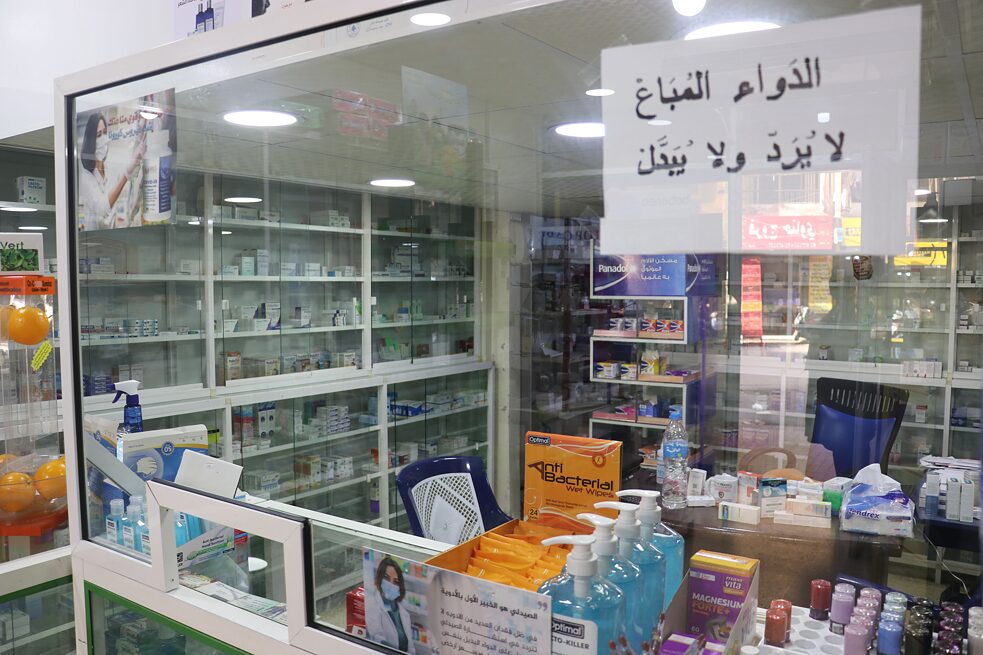 For a long time, the scope of drugs in the market was huge. However, many medications are no longer available now.
| Goethe-Institut/Ruya, Zeinab Othman
For a long time, the scope of drugs in the market was huge. However, many medications are no longer available now.
| Goethe-Institut/Ruya, Zeinab Othman
The role of pharmacists
Pharmacists on their part try to play a role. In one of the biggest pharmacies, in Tariq Al-Jadida district, board member of the Lebanese pharmacists syndicate, Marwa Al-Jamal, tells us that pharmacists, through trade union organization, are trying to frame these solutions, after reviewing significant parts of the problem. While talking to her, electricity was cut several times off the pharmacy, and many customers were taken by surprise when they didn’t find their medicine. However, unlike citizens improvising individual solutions, Marwa believes that the solution lies in the “medicine card”, which is a digital card that enables the Lebanese Ministry of Health to track the chain of the stages of medicine supply from any factory in the world all the way to patients.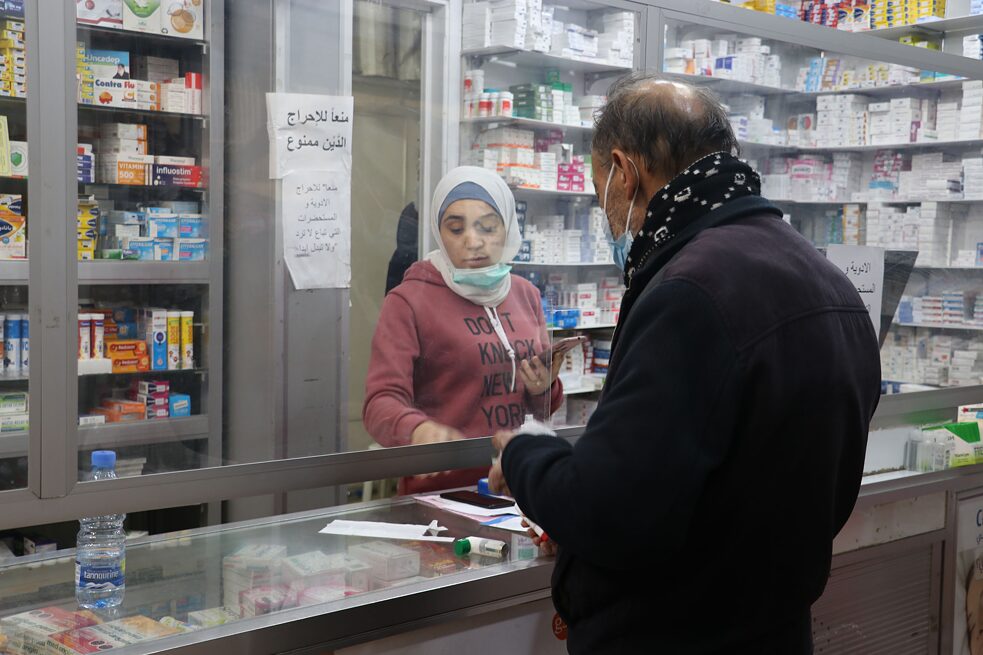 In a pharmacy in Beirut, a customer takes advice from a pharmacist. Many medications are no longer available. The drugs which are still available aren’t affordable for many, because all prices are still in US dollars.
| Goethe-Institut/Ruya, Zeinab Othman
She believes in the ability of the syndicate to contribute in the general solidarity process, and help in implementing suggested solutions, especially the support of the pharmaceutical industry locally, and considerably reducing its import.
In a pharmacy in Beirut, a customer takes advice from a pharmacist. Many medications are no longer available. The drugs which are still available aren’t affordable for many, because all prices are still in US dollars.
| Goethe-Institut/Ruya, Zeinab Othman
She believes in the ability of the syndicate to contribute in the general solidarity process, and help in implementing suggested solutions, especially the support of the pharmaceutical industry locally, and considerably reducing its import.
In turn, the Head of pharmacist in Lebanon explains that for two years there have been demands for rationalizing support and partially remove it from Brand medicines, which is the original imported medicine; noting that the last demand “wasn’t achieved until recently, but pharmacists are unable to restock medicine, nor are patients able to afford the medicine which became too expensive due to the Dollar crisis”. Today, Sallom considers the medicine card an essential requirement the importance of which outweighs that of the cash card in his opinion. With regards to prices, Sallom says “we need an annual funding of around 300 million USD to be taken from the International Bank. The idea is based on depositing a specific amount of money in the card of every Lebanese citizen enabling them to buy their medicines from the pharmacy. This way we can track their purchases through the tracking system to prevent monopoly, stacking, smuggling and controlling huge amounts of medicines available to each patient”. From a technical point of view, the option of the Chief seems to be a suitable one, in terms of solidarity between many sides.
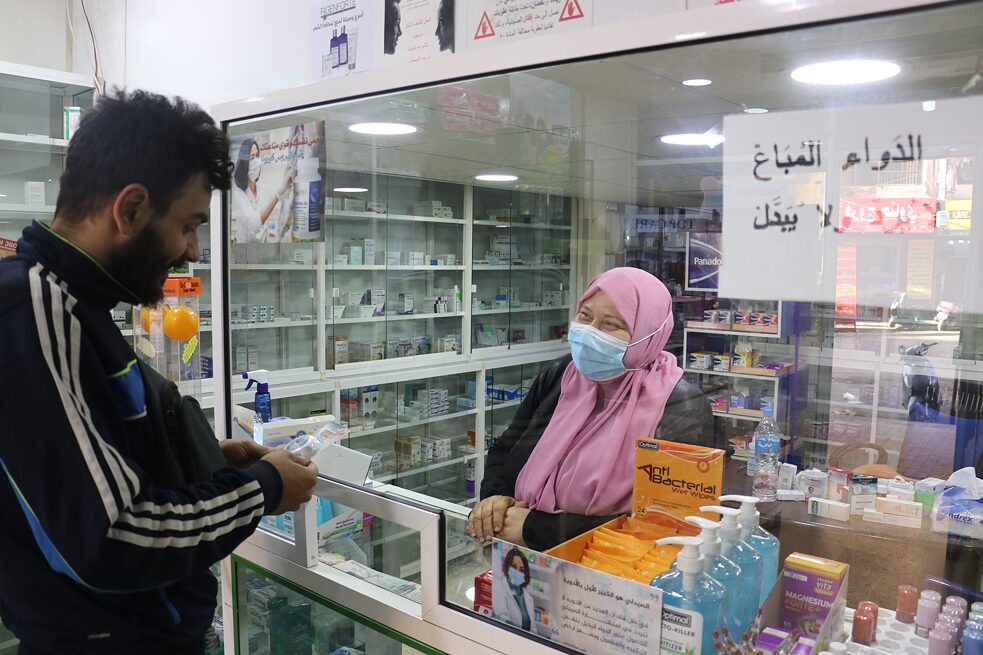 In a pharmacy in Beirut, a customer takes advice from a pharmacist. Many medications are no longer available. The drugs which are still available aren’t affordable for many, because all prices are still in US dollars.
| Goethe-Institut/Ruya, Zeinab Othman
However, it remains contingent on a form rejected by a huge portion of the Lebanese people, who are apprehensive about the policies of the International Monetary Fund, or about applying these policies under the current political system.
In a pharmacy in Beirut, a customer takes advice from a pharmacist. Many medications are no longer available. The drugs which are still available aren’t affordable for many, because all prices are still in US dollars.
| Goethe-Institut/Ruya, Zeinab Othman
However, it remains contingent on a form rejected by a huge portion of the Lebanese people, who are apprehensive about the policies of the International Monetary Fund, or about applying these policies under the current political system.However, according to the Chief, who is directly involved in the issue of the medicine, as the crises is intensifying currently, “We can say that this card is the only short-term solution (between 1 and 2 years)”. There are many unanswered questions on this card, like the benefit of non-Lebanese from it, especially in the presence of a 1.5 million Syrian refugees in Lebanon, and also regarding how far the Lebanese themselves can benefit from it, with their various needs for it, which is classified according to the nature of illnesses. Anyway, Salloum doesn’t deny that this plan is just for buying time until “the Dollar crisis ends and the market returns to normal”. An opinion many pessimistic Lebanese struggling to survive disagree with. As for the radical solution, the Chief of Pharmacists tells us that “the role of guaranteeing funds should be preserved in order for citizens not to bear the high costs of medicine”. Regarding the government retrieving the medicine sector from monopoly companies, the Chief says “the country has a free economic system, there are exclusive agencies or monopoly, as well as local competitions. When support is lifted altogether, medicines will be available and companies will be able to sell them (according to their USD prices, not local currency) and there will be competition”.
This takes us back to the starting point, where Lebanese face a crisis within a crisis: if medicine becomes available, how are they going to afford its high price? On the short term, in light of answers from people directly involved, from citizens to pharmacists. It seems that, currently, the Lebanese have no solution but to depend on themselves, through more individual and collective solidarity, until they reach a health “care” that is safer, more secure and adaptive to the nature of a modern state.
April 2022
